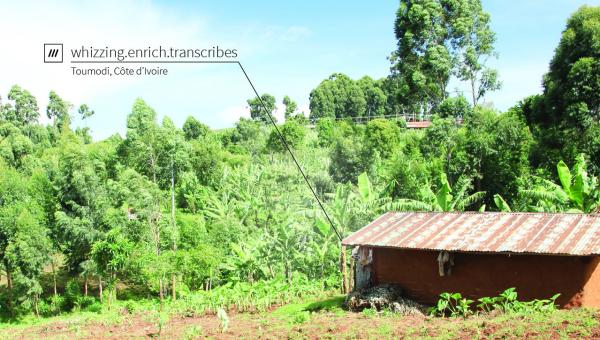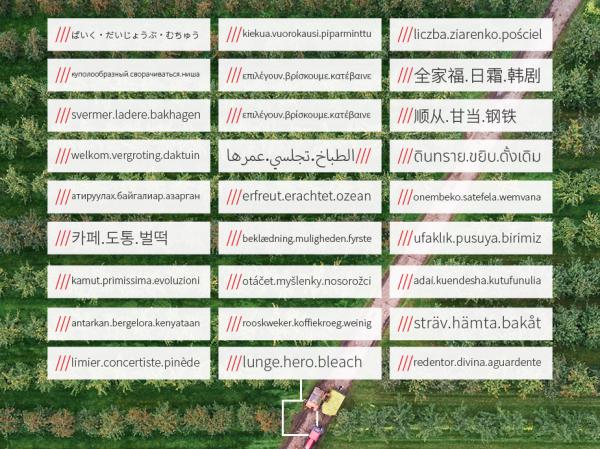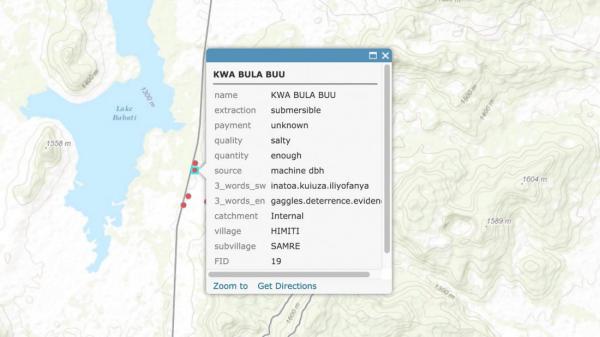Address, or you will not be addressed
And possibly forget your history.

Traditional addresses, says a London startup, are too “expensive to provide”, restrictive and prone to error. This is why What3Words has invented “the simplest way to talk about location”: first, it divided the world into 57 trillion squares, each 3x3 meters wide. Then, it associated to each of those squares, no matter how remote, a unique combination of 3 words, from a semi-arbitrary vocabulary with about forty thousands entries.

Each SINGLE parking spot has a unique address in What3Words
</em></u>
That division in squares, and the corresponding sequences of three words make an addressing system that “in five years, the company wants to be accepted as the global standard”, for every location on Earth. The dimension of the squares make What3Words as accurate as any human being may realistically need. At the same time, the adddress format makes What3Words much easier and faster to remember, spell out or type without errors than GPS coordinates, or any other number-only format.
What3Words success stories
We Elects of the “First” World can use What3Words to “find friends at crowded festivals”, or hail a ride with even less effort from, for example, Cabify (Uber’s main rival in Latin America). People having a stroke may communicate their locations to ambulances more effectively.
Corporations like Kakao and Daimler already integrate What3Words in messaging platforms or, respectively, voice-activated in-car navigation interface. But a system as accurate and easy to use as What3Words can be a life changer for the billions of people worldwide who still live without a “real” address. In Mongolia, What3words is officially accepted by banks, taxis, and the national postal services, as well. In Uganda, each single one of the 100,000 residents in a refugees camp can receive deliveries and medical assistance, quickly and without errors, at its own, unique What3words address.
What3Words was also adopted in 2016 as the postal standard for “Ivory Coast street addresses”. But if that is the case, why are delivery services still so hard in Abidjan?
Multilingual. But without a past

The first thing I thought when I discovered What3Words was “are these guys just claiming to themselves the right to give a name in THEIR language to EVERY spot on Earth???”. But I quickly found out that the app is available in 35 languages, and counting. Still, I wouldn’t be surprised at all, if in the near future it starts getting the same kind of reactions as Elon Musk’s bid to “own” the night sky. It is also quite likely that some of those trillion squares have been named in ways that, in some language, are really offensive or ridiculous. Like, you know, that Ford model named “tiny male genitals” in Brazil.

tiny.male.genitals? Hey, look! It's THREE WORDS!
</em></u>
The thing that actually concerns me, though, is the long-term effects on societies. Place names are important. They are history, culture, feelings. They are family or personal memories. Traditional addresses make places different from each other. They unify the community that lives there, and give it a precise identity. Basque Country, Catalunya, South Tyrol and surely many other places have fought to have street names in one or more languages. For westerners, one of the reasons to visit Tokyo is its addressing system. Look at this What3Words address in Tanzania, instead:

Sure, it is in Swahili, but (if Word Hippo is right!!!) “inatoa.kuiuza.iliyofanya” means something like “offers.sell-it.it-did”. No relation whatsoever to the place.
What happens when the most convenient way for everybody to identify a location is a sequence of words that have no link at all, of any kind, to that location? What feelings of forced assimilation and estrangement can it bring? Is this, like certain kinds of automation one more step through making people like robots, rather than replacing people with robots?
The DNS of street addresses. Just without choice. And for profit.
What3Words has been issued patents for “A method and apparatus for identifying and communicating locations”. To begin with, I wonder why those specific patents were issued. At that level, What3Words really seems a mere porting to street addresses of the same trick we all play since 1983 with websites. The Domain Name Systems maps, to names that are much easier to remember for us, the numeric addresses of websites that are completely usable without those names. What3Words does the same thing with GPS coordinates.
But the real issue is another one: unless someone else claimed it first, everyone can start her own website and choose its name, that is decide how everybody else should find it. What3Words has done something deeply different. They just came and said to everybody “THIS is how your doorstep must be called from now on”. Yes, of course, GPS or Galileo do the same, but at the numeric level is basically unavoidable, and much less relevant. How many human beings care of why their tax identification number is that combination of digits instead of another? Names are much more important to humans.
Things are even worst when you consider that this is not, like GPS, a not-for-profit standard. What3Words system is something that one, for-profit organization makes “free to use for the general public, as well as for nonprofits”, because the company plans to make money “by licensing its code to businesses that want to integrate it with their systems”.
Any advocate of Open Data may talk at length of why and how restricting free usage of certain data to non-commercial application is not the best path to real progress.
Fact is, from what I understand What3Words may freely play to some country, or community, in any moment, the same trick Microsoft played to Iceland twenty years ago: refuse to localize a “standard” for something that is much more essential than any operating system, just because it is not profitable enough.
If this is the case, it is really bad. What3Words seems a really neat application, of an already existing idea, that can solve a lot of real problems worldwide. But it really should not be a proprietary standard.
Who writes this, why, and how to help
I am Marco Fioretti, tech writer and aspiring polymath doing human-digital research and popularization.
I do it because YOUR civil rights and the quality of YOUR life depend every year more on how software is used AROUND you.
To this end, I have already shared more than a million words on this blog, without any paywall or user tracking, and am sharing the next million through a newsletter, also without any paywall.
The more direct support I get, the more I can continue to inform for free parents, teachers, decision makers, and everybody else who should know more stuff like this. You can support me with paid subscriptions to my newsletter, donations via PayPal (mfioretti@nexaima.net) or LiberaPay, or in any of the other ways listed here.THANKS for your support!